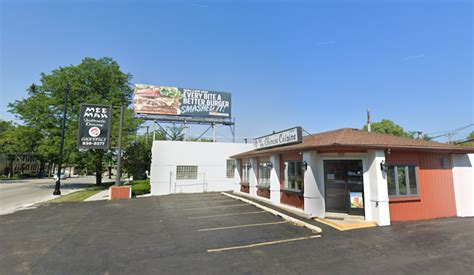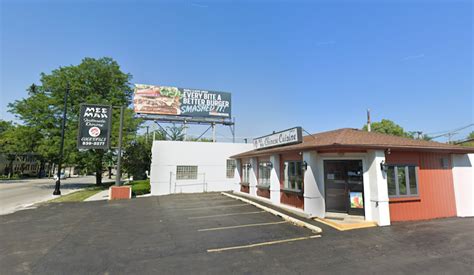
A Chicago culinary landmark, Manny’s Cafeteria & Delicatessen, a beloved institution serving traditional Jewish deli fare for over 75 years, abruptly closed its doors on Sunday, March 31st, leaving loyal customers and the city’s food scene in shock. The sudden closure, announced via a note taped to the restaurant’s door and a corresponding social media post, cited “circumstances beyond our control” as the reason for the immediate shutdown.
Manny’s, located at 1141 South Jefferson Street, was more than just a restaurant; it was a cultural touchstone, a gathering place for generations of Chicagoans, and a symbol of the city’s rich history. Known for its massive corned beef sandwiches, matzo ball soup, and other classic deli offerings, Manny’s had earned a reputation for quality, consistency, and a warm, familial atmosphere. Its closure marks a significant loss for the city’s culinary landscape.
“To all of our loyal customers, with a heavy heart, we announce that after 76 amazing years, Manny’s Cafeteria & Delicatessen is now closed. Thank you for all the memories,” read the message posted on the restaurant’s Facebook page. The succinct announcement offered no further explanation, fueling speculation and sadness among its devoted patrons.
The suddenness of the closure has left many wondering about the underlying reasons. While the ownership cited “circumstances beyond our control,” the specific factors leading to the decision remain unclear. The restaurant industry, particularly independent establishments like Manny’s, has faced numerous challenges in recent years, including rising costs of ingredients, labor shortages, and increased competition from chain restaurants and delivery services. The long-term impact of the COVID-19 pandemic, which significantly disrupted the restaurant industry, may also have played a role.
Manny’s history in Chicago dates back to 1948 when Manny Raskin, an immigrant with a passion for traditional Jewish cuisine, opened the first iteration of the deli. Over the years, Manny’s evolved from a small neighborhood eatery into a nationally recognized institution. It became a favored spot for politicians, celebrities, and everyday Chicagoans alike, all drawn to its authentic flavors and unpretentious atmosphere. The restaurant had even been featured in numerous television shows and movies, further cementing its place in popular culture.
For decades, Manny’s was a family-run business, with succeeding generations carrying on Manny Raskin’s legacy. The current ownership, while not explicitly named in the closing announcement, is believed to be descendants of the founder. The dedication to maintaining the original recipes and traditions contributed significantly to Manny’s enduring appeal. Regular customers often spoke of the comfort and nostalgia associated with dining at Manny’s, viewing it as a connection to the city’s past.
The loss of Manny’s extends beyond just the culinary realm. It represents a blow to Chicago’s cultural identity and a reminder of the challenges faced by locally owned businesses. In an era of increasing homogenization and corporate dominance, the closure of a unique and cherished institution like Manny’s underscores the importance of supporting independent businesses and preserving local traditions. The impact on the employees, many of whom had worked at Manny’s for years, is also a significant concern. The closure leaves them without jobs and disrupts their livelihoods.
The outpouring of grief and nostalgia on social media following the announcement highlights the profound impact Manny’s had on the Chicago community. Customers shared their favorite memories of dining at the restaurant, reminiscing about family gatherings, celebratory meals, and the simple pleasure of enjoying a perfectly made corned beef sandwich. Many expressed their sadness at the loss of a beloved institution and their concern for the future of Chicago’s culinary heritage.
The future of the Manny’s location remains uncertain. It is unclear whether the space will be sold, leased, or repurposed in some other way. The closure raises questions about the viability of traditional delicatessens in the modern food landscape and the challenges faced by family-owned businesses in competing with larger corporations. While the memory of Manny’s will undoubtedly live on in the hearts of its loyal customers, the closure marks the end of an era for Chicago’s culinary scene. The loss is immeasurable for those who saw it as more than a restaurant, but a vital part of their lives.
The absence of Manny’s will be felt throughout the city, leaving a void in the culinary landscape and a reminder of the importance of preserving local traditions and supporting independent businesses. The community is left to reflect on the legacy of Manny Raskin and the impact of his beloved delicatessen on the lives of countless Chicagoans.
In-Depth Analysis and Background
Manny’s Cafeteria & Delicatessen was more than just a place to grab a bite; it was a living, breathing piece of Chicago history. Its roots were deeply embedded in the city’s immigrant experience, specifically the Jewish community that flourished on the city’s West Side and later migrated to other parts of the city. The deli served as a cultural hub, a place where people could connect with their heritage and share traditions.
The rise of Jewish delis like Manny’s in the early to mid-20th century mirrored the growth and assimilation of the Jewish population in American cities. These delis offered familiar tastes and flavors that reminded immigrants of home, providing a sense of comfort and belonging in a new and often challenging environment. Over time, Jewish delis evolved from serving primarily Jewish customers to attracting a wider audience, becoming an integral part of the American culinary landscape.
Manny’s distinguished itself from other delis through its unwavering commitment to quality and authenticity. The recipes were passed down through generations, ensuring that the food retained its original flavors and character. The corned beef, a signature item on the menu, was prepared using a traditional curing process that took several days, resulting in a tender, flavorful, and unforgettable product. The matzo ball soup, another staple, was made from scratch using a time-honored recipe that had been perfected over decades.
The cafeteria-style service at Manny’s also contributed to its unique atmosphere. Customers would line up, select their dishes from a wide array of offerings, and then find a seat at one of the communal tables. This created a sense of camaraderie and encouraged interaction among diners, fostering a feeling of community. The lively atmosphere, the aroma of freshly prepared food, and the friendly banter among customers and staff all contributed to the overall experience of dining at Manny’s.
The restaurant’s location on South Jefferson Street, near the heart of Chicago’s West Loop, played a significant role in its success. The West Loop has undergone a dramatic transformation in recent years, evolving from an industrial district into a trendy neighborhood with a thriving restaurant scene. While many new restaurants have opened in the area, Manny’s remained a steadfast presence, a reminder of the neighborhood’s past.
Manny’s also benefited from its reputation as a favorite among politicians and celebrities. The restaurant had hosted numerous prominent figures over the years, including mayors, governors, senators, and actors. These visits helped to raise the restaurant’s profile and attract new customers. The walls of Manny’s were adorned with photographs of famous patrons, serving as a testament to its enduring appeal.
However, despite its rich history and loyal following, Manny’s faced increasing challenges in recent years. The restaurant industry as a whole has become increasingly competitive, with new restaurants opening at a rapid pace. Manny’s, like many other independent restaurants, struggled to compete with larger chains that have greater resources and economies of scale.
Rising costs of ingredients and labor also put pressure on Manny’s bottom line. The price of corned beef, a key ingredient, has fluctuated significantly in recent years, making it difficult for the restaurant to maintain its margins. The minimum wage in Chicago has also increased, adding to the restaurant’s labor costs.
The COVID-19 pandemic further exacerbated these challenges. The pandemic forced Manny’s to temporarily close its doors and switch to takeout and delivery service. While the restaurant eventually reopened for dine-in service, it continued to operate under restrictions that limited its capacity. The pandemic also changed consumer behavior, with more people opting to eat at home or order takeout.
It is unclear exactly which of these factors ultimately led to Manny’s closure. The vague explanation of “circumstances beyond our control” suggests that a combination of factors may have been at play. It is possible that the restaurant was facing financial difficulties, or that the owners were simply ready to retire and did not have a successor to take over the business.
Regardless of the specific reasons, the closure of Manny’s represents a significant loss for Chicago’s culinary scene. The restaurant was a beloved institution that had been serving the city for over 75 years. Its closure marks the end of an era and serves as a reminder of the importance of supporting independent businesses and preserving local traditions.
The legacy of Manny’s will undoubtedly live on in the memories of its loyal customers. The restaurant was more than just a place to eat; it was a gathering place, a community hub, and a symbol of Chicago’s rich history. Its closure will be deeply felt by all who had the pleasure of dining there.
The Future of Delicatessens
The closure of Manny’s raises questions about the future of traditional delicatessens in the modern food landscape. While there is still a strong demand for deli fare, many delicatessens are struggling to survive in the face of increased competition and rising costs.
One challenge that delicatessens face is the changing tastes of consumers. Many people are now looking for healthier and more diverse dining options. Traditional deli fare, with its focus on meat and carbohydrates, may not appeal to everyone.
Another challenge is the rise of fast-casual restaurants. These restaurants offer a more modern and convenient dining experience than traditional delicatessens. They often have a wider variety of menu items and offer online ordering and delivery services.
To survive in the modern food landscape, delicatessens need to adapt and innovate. They need to offer healthier menu options, embrace technology, and find ways to differentiate themselves from the competition. They also need to focus on providing excellent customer service and creating a welcoming atmosphere.
Some delicatessens have successfully adapted to the changing times. They have added new menu items, such as salads and vegetarian options, and have invested in technology to improve their efficiency. They have also focused on creating a unique and memorable dining experience for their customers.
The future of delicatessens is uncertain, but there is still hope for these traditional institutions. By adapting and innovating, delicatessens can continue to thrive and serve their communities for many years to come.
Community Reactions and Memories
The news of Manny’s closure reverberated throughout Chicago, eliciting a wave of sadness, nostalgia, and disbelief. Social media platforms were flooded with tributes from loyal customers who shared their cherished memories of dining at the iconic delicatessen.
Many customers recalled visiting Manny’s with their families for special occasions, such as birthdays, anniversaries, and graduations. They spoke of the joy of sharing a massive corned beef sandwich with their loved ones and the warmth of the restaurant’s welcoming atmosphere.
Others reminisced about the sense of community they felt at Manny’s. They described the communal tables as a place where people from all walks of life could come together and share a meal. They recalled striking up conversations with strangers and making new friends.
Many customers also praised the quality and authenticity of the food at Manny’s. They spoke of the perfectly cured corned beef, the flavorful matzo ball soup, and the other classic deli offerings. They appreciated the fact that the recipes had been passed down through generations and that the food was made with care and attention to detail.
The closure of Manny’s was seen by many as a loss for Chicago’s cultural heritage. The restaurant was a symbol of the city’s rich history and its diverse culinary traditions. Its closure marks the end of an era and serves as a reminder of the importance of preserving local institutions.
The outpouring of grief and nostalgia following the announcement of Manny’s closure underscores the profound impact the restaurant had on the Chicago community. Manny’s was more than just a place to eat; it was a gathering place, a community hub, and a symbol of Chicago’s identity. Its memory will live on in the hearts of its loyal customers for many years to come.
Impact on Employees
The closure of Manny’s has had a significant impact on its employees, many of whom had worked at the restaurant for years. The closure leaves them without jobs and disrupts their livelihoods.
Many of Manny’s employees were long-time veterans of the restaurant industry. They had dedicated their lives to serving customers and providing them with a memorable dining experience. They were skilled and experienced workers who took pride in their work.
The closure of Manny’s has left these employees with uncertain futures. They are now faced with the challenge of finding new jobs in a competitive market. They may need to retrain for new careers or relocate to find work.
The loss of Manny’s is not only a personal tragedy for its employees but also a loss for the Chicago community. These employees were an integral part of the restaurant’s identity and its welcoming atmosphere. Their absence will be deeply felt by customers who had come to know and appreciate them over the years.
The closure of Manny’s serves as a reminder of the human cost of economic change. When businesses close, it is not only the owners and investors who are affected but also the employees who rely on those businesses for their livelihoods.
Frequently Asked Questions (FAQ)
1. Why did Manny’s Cafeteria & Delicatessen close?
The official announcement cited “circumstances beyond our control” as the reason for the closure. However, the specific factors leading to the decision remain unclear. Potential contributing factors could include rising costs of ingredients and labor, increased competition from chain restaurants and delivery services, and the lingering impact of the COVID-19 pandemic. It is possible a combination of financial strain and internal factors led to the difficult decision.
2. How long was Manny’s in business?
Manny’s Cafeteria & Delicatessen was in business for 76 years, having first opened its doors in 1948. It served generations of Chicagoans and became a landmark institution.
3. What was Manny’s known for?
Manny’s was renowned for its traditional Jewish deli fare, particularly its massive corned beef sandwiches, matzo ball soup, and other classic dishes. It was also known for its cafeteria-style service, warm and welcoming atmosphere, and its role as a gathering place for the Chicago community. Its consistent quality and adherence to traditional recipes cemented its place in the city’s culinary history.
4. Will Manny’s ever reopen?
As of now, there is no indication that Manny’s will reopen. The announcement of the closure appeared to be final. The future of the building and the Manny’s brand remain uncertain, with possibilities ranging from sale and redevelopment to repurposing of the space. The owners have not released any statements suggesting a potential revival of the restaurant.
5. What will happen to the employees of Manny’s?
The closure of Manny’s has left its employees without jobs. They will need to seek new employment opportunities. The city and local organizations may offer resources to help them with job searching, resume writing, and career counseling. Many were long-time employees, so this represents a significant disruption to their lives and careers.
The story of Manny’s is a reflection of Chicago’s rich culinary heritage, the challenges faced by family-owned businesses, and the enduring power of food to bring people together. Its closure is a loss that will be deeply felt by the city’s residents for years to come. The community’s response highlights the importance of supporting local businesses and celebrating the unique traditions that define Chicago’s cultural landscape. The memories of Manny’s will undoubtedly live on, serving as a reminder of the importance of preserving the city’s culinary history and supporting the businesses that contribute to its unique character. The abrupt shuttering leaves a gaping hole in the deli scene, leaving many pondering the future of such establishments in an ever-changing culinary world.









